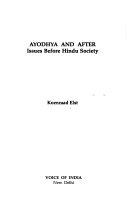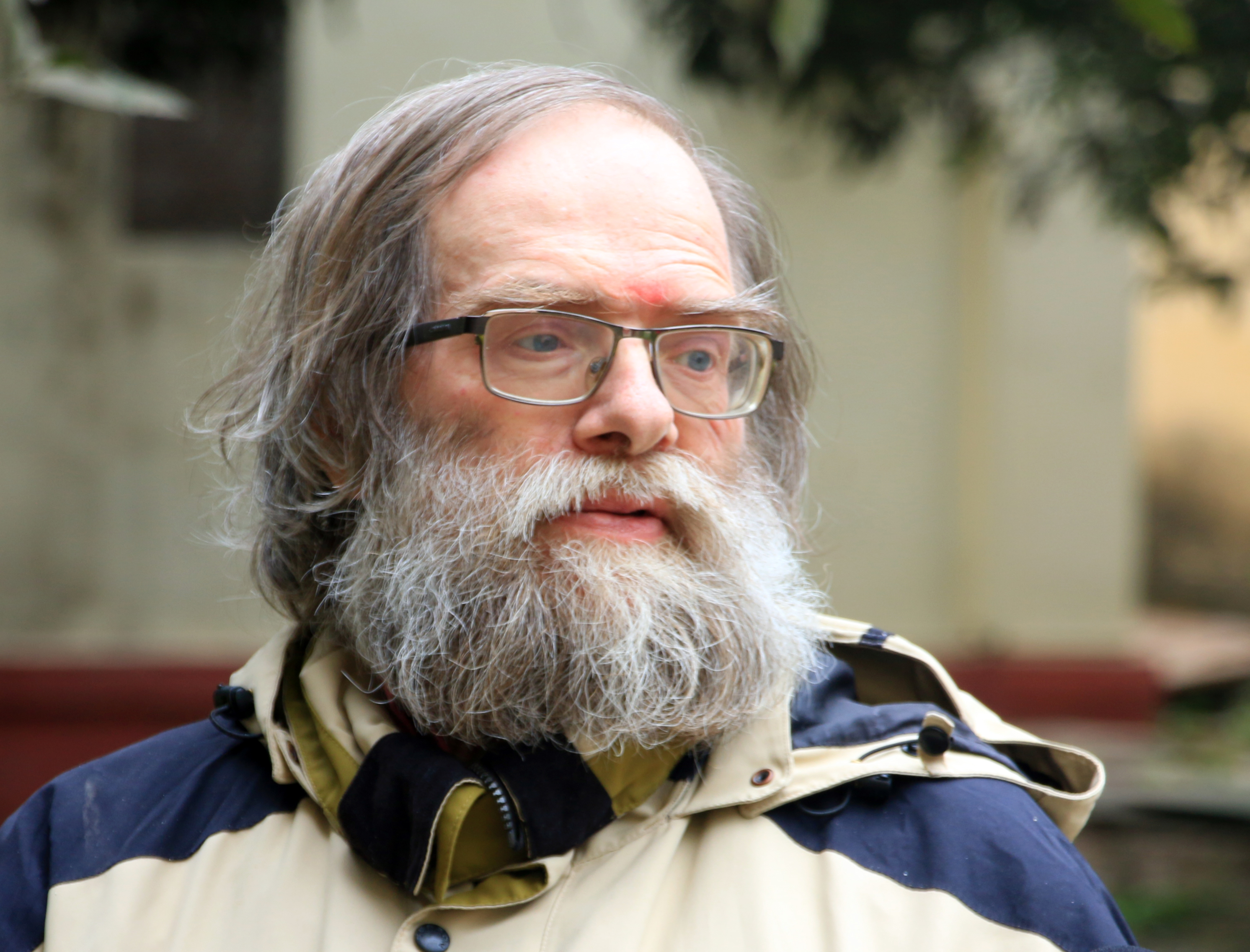1990s, Negationism in India, (1992)
Works

Ayodhya and After
Koenraad Elst
Update on the Aryan Invasion Debate
Koenraad ElstFamous Koenraad Elst Quotes
1990s, Negationism in India, (1992)
Source: 1990s, BJP vis-à-vis Hindu Resurgence (1997)
2000s, Ayodhya: The Case Against the Temple (2002)
2000s, Decolonizing the Hindu Mind (2001)
2000s, The Problem with Secularism (2007)
Koenraad Elst Quotes about history
1990s, Ayodhya and After: Issues Before Hindu Society (1991)
1990s, Ayodhya and After: Issues Before Hindu Society (1991)
2000s, Ayodhya, the Finale (2003)
Such are the true concerns of the “secularists” warning the world against the attempts at glasnost in India's national history curriculum.
2000s, The Problem with Secularism (2007)
2000s, Who is a Hindu, (2001)
The great lies and distortions of Soviet historiography are now items in the gallery of ridicule.... Just like the Russians have thrown Soviet historiography into the dustbin, Indian negationism will also be thrown out in the near future.
1990s, Negationism in India, (1992)
Koenraad Elst: Trending quotes
K. Elst : The Ayodhya Demolition: an Evaluation, in India., & Dasgupta, S. (1995). The Ayodhya reference: The Supreme Court judgement and commentaries.
1990s
2000s, Who is a Hindu, (2001)
Koenraad Elst, ed.: India’s Only Communalist. In Commemoration of Sita Ram Goel, Voice of India, Delhi 2005
2000s
Koenraad Elst Quotes
2000s, Ayodhya, the Finale (2003)
1990s, Ayodhya and After: Issues Before Hindu Society (1991)
Hinduism, Environmentalism and the Nazi Bogey -- A preliminary reply to Ms. Meera Nanda, In: Return of the Swastika: Hate and Hysteria versus Hindu Sanity (2007), chapter 3.
2000s, Return of the Swastika (2007)
1990s, Update on the Aryan Invasion Debate, (1999)
“Hindus are damned if they do, damned if they don't.”
Source: 2000s, Decolonizing the Hindu Mind (2001), p. 97
1990s, Ayodhya and After: Issues Before Hindu Society (1991)
Quoted from Lal, K. S. (1994). Muslim slave system in medieval India. New Delhi: Aditya Prakashan. Chapter 6
1990s, Negationism in India, (1992)
Koenraad Elst, Ayodhya and After: Issues Before Hindu Society (1991)
1990s, Ayodhya and After: Issues Before Hindu Society (1991)
In Freedom of expression - Secular Theocracy Versus Liberal Democracy (1998, edited by Sita Ram Goel) ISBN 81-85990-55-7
1990s
“Not Muslims but Islam is the problem.”
In addition, also in: Book Review - Saffron Wave http://koenraadelst.bharatvani.org/reviews/saffronwave.html,; Let's Combat Communalism, Koenraad, Elst, Sangh Parivar's Apologist", a review of Decolonizing the Hindu Mind: Ideological development of Hindu Revivalism, Rupa, Delhi, 2001 by Ayub Khan in Communalism Watch, 13 March 2003 http://koenraadelst.bharatvani.org/articles/politics/PolSec03AyubKhan1.html,; [Lucas Catherine, Vuile Arabieren, 81, Dutch] quoted at Het VB en de islam, Koenraad, Elst http://koenraadelst.bharatvani.org/articles/dutch/isvb.html,
2000s, The Problem with Secularism (2007)
more properly to be called the Islam problem
1990s, Negationism in India, (1992)
Also quoted in Altered Destinations: Self, Society, and Nation in India by Makarand R. Paranjape
1990s, BJP vis-à-vis Hindu Resurgence (1997)
2000s, Who is a Hindu, (2001)
2000s, Ayodhya: The Case Against the Temple (2002)
1990s, BJP vis-à-vis Hindu Resurgence (1997)
2000s, Who is a Hindu, (2001)
Sri Aurobindo: Foundations of Indian Culture, p.135
2000s, Ayodhya: The Case Against the Temple (2002)
Source: 2000s, Ayodhya: The Case Against the Temple (2002)
removing relevant old books from libraries, adding words on an old map
1990s, The Ayodhya Demolition: an Evaluation (1995)
1990s, Ayodhya and After: Issues Before Hindu Society (1991)
2000s, Decolonizing the Hindu Mind (2001)
2000s, Ayodhya: The Case Against the Temple (2002)
Source: From an interview with Dr. Ramesh Rao (2002) at sulekha.com http://koenraadelst.bharatvani.org/interviews/sulekha.html
2000s, Decolonizing the Hindu Mind (2001)
2000s, Who is a Hindu, (2001)
2000s, Ayodhya: The Case Against the Temple (2002)
1990s, Negationism in India, (1992)
K. Elst : The Ayodhya Demolition: an Evaluation, in India., & Dasgupta, S. (1995). The Ayodhya reference: The Supreme Court judgement and commentaries.
1990s, The Ayodhya Demolition: an Evaluation (1995)
1990s, Ayodhya and After: Issues Before Hindu Society (1991)
1990s, Ayodhya and After: Issues Before Hindu Society (1991)
2000s, Gujarat after Godhra: Real violence, selective outrage (2003)
2000s, Ayodhya: The Case Against the Temple (2002)
1990s, Ayodhya and After: Issues Before Hindu Society (1991)
Source: 2000s, Decolonizing the Hindu Mind (2001), p. 73-74
1990s, Negationism in India, (1992)
2000s, The Problem with Secularism (2007)
1990s, Negationism in India, (1992)
1990s, Ayodhya and After: Issues Before Hindu Society (1991)
Elst, Indigenous Indians, 375, 381. quoted from Lal, K. S. (1994). Muslim slave system in medieval India. New Delhi: Aditya Prakashan.
1990s
1990s, Negationism in India, (1992)
2000s, Ayodhya: The Case Against the Temple (2002)
Asatya or Anrita
In Sita Ram Goel: Jesus Christ - An Artifice for Aggression (1994)
1990s
2000s, Decolonizing the Hindu Mind (2001)
K. Elst : The Ayodhya Demolition: an Evaluation, in India., & Dasgupta, S. (1995). The Ayodhya reference: The Supreme Court judgement and commentaries.
1990s
Quoted in "The Myth of Saint Thomas and the Mylapore Shiva Temple: Third Revised Edition" by Ishwar Sharan (2010) https://books.google.com.au/books?id=HL35NxR5S_QC
2000s
